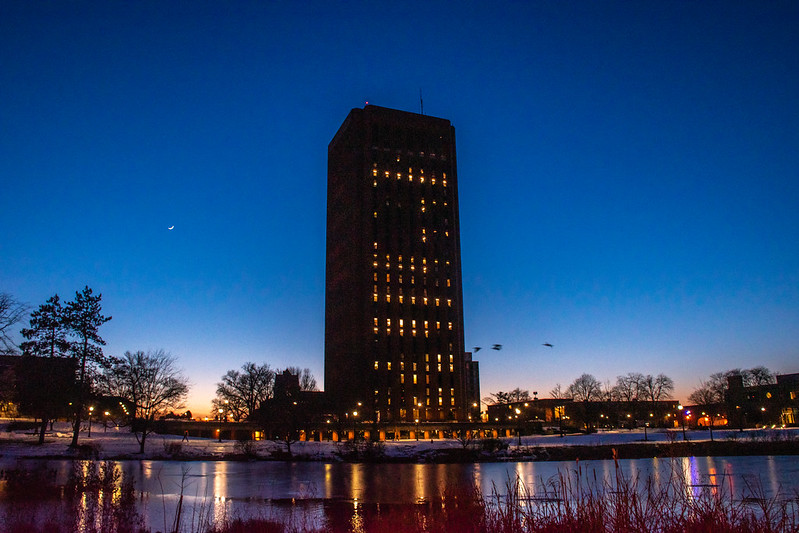The University of Massachusetts Education Abroad Program has limited programs throughout the COVID-19 pandemic to maintain its operation and to keep student travelers safe. Education Abroad is still sending students all over the world, though the experience may differ from pre-COVID times.
“We’re still in the business of sending students abroad,” said Director of Education Abroad Mark Eckman.
During the spring of 2020, before students abroad were sent back to the United States due to the pandemic, the number of undergraduate study abroad students was at a peak of 750-to-800. This semester, there are about 400 students traveling.
“Once COVID hit we had to completely change gears and that became a primary focus in my work in terms of determining what countries were still safe for students to travel,” said Director of International Health, Safety and Security Andrea Drake.
During fall 2020, the number of programs available to students was below 200, while in previous years, Education Abroad had about 450 approved programs.
Education Abroad had to reevaluate programs in different countries in 2020 to proceed with sending students abroad. “We started to narrow the options available and focused really on partners that we trust and that had shown the ability to support students throughout the pandemic,” Drake said.
Programs were chosen based on meeting certain requirements within housing, quarantining, testing and cleaning procedures. By narrowing down the list of programs offered, Education Abroad felt it could be confident about the programs and their alignment with UMass’ expectations for students.
In earlier semesters, Eckman said, Education Abroad was not able to give students the certainty that their programs would take place. At this time, that’s no longer a concern.
“I remain very optimistic about the direction and the trajectory of Education Abroad because international education has never been more important,” Eckman said, referring to the recent Russian invasion in Ukraine and events unrelated to COVID-19 that could impact students studying abroad.
“We don’t have any plans to cancel programs on the basis of COVID alone,” Drake added. This would only change with a drastic increase of cases and high hospitalization rates.
In reference to the vaccination and booster requirements, Drake said, “For the most part we know that students are probably going to have a mild or even asymptomatic case.”
Students who have all their vaccinations have been said to experience milder and less life-threatening symptoms. Although each program handles COVID-positive students differently based on local regulations, Drake explained that student needs are being met through their partner programs.
“I haven’t heard from one student who has tested positive that they had a bad experience,” Drake recalled. The programs Education Abroad partners with have helped students by bringing them food and helping with laundry when they need to quarantine.
“It finally feels like we have gotten to a place where it’s subsiding a little bit,” Drake said.
In each country, there are different restrictions depending on the severity of COVID rates.
“It was just like life as it was before the pandemic in Denmark in terms of traveling,” said Megan Doherty, a senior double major in public health and journalism.
Doherty went to Copenhagen for her study abroad experience in fall 2021. For most of her trip, Doherty experienced little-to-no restrictions, including mask mandates. Doherty explained that to get into bars, restaurants and clubs, she would have to show her “Corona Pass,” which was essentially her U.S. vaccination card.
“We had to constantly stay up to date on the COVID situation in other countries as well as that in Denmark,” Doherty said. She was able to travel to seven countries with “no issues” since her program required vaccinations and the booster shot.
“It was definitely restricted in some way, and it was way more stress-inducing than I’d say a normal study-abroad experience would have [been],” Doherty said. She felt that getting sent home “was always a fear” because she was traveling during a pandemic.
Despite being in a pandemic, “interest in study abroad is quite high,” Eckman said.
Sophomore public health major Bridget Miller expressed concern over her ability to go to different places and surrounding countries due to COVID-19 regulations, along with concerns about her program being canceled.
“I’m not as excited as I want to be just because I don’t want to let myself plan everything and really be looking forward to it because I’m a little apprehensive to fully embrace it,” Miller explained.
Miller plans on studying abroad for two semesters starting in fall 2022 at Vrije University in Amsterdam. Many sophomores like Miller did not get a typical freshman year due to COVID.
“It [COVID] just made me realize that if I’m going to do stuff, I have to do it now,” Miller said.
“You can’t really prepare for it, it’s almost like an impending doom,” sophomore Spanish major and IT minor Ailish McBride said. McBride plans on studying abroad in spring 2023 and is interested in going to Spain — specifically Barcelona — but she worries about not being able to go due to COVID.
“If I don’t go then I have to figure out housing for the spring semester,” McBride said, explaining that if her program were to be canceled right before she went, she’d have to make decisions regarding housing and courses much later than she normally would have.
“For students who are considering going abroad right now, I’d say get going on the process early,” Drake suggested.
Drake also advises students to get tested for COVID prior to traveling, as some programs require a negative test result to prevent delays. While COVID-19 has made the process of studying abroad more difficult for students, with enough time and preparation, anyone can go abroad Drake said.
Khyliana Camarao can be reached at [email protected].



















Nicole Camarao • May 6, 2022 at 1:19 pm
Good to hear the university is doing everything to ensure this program is still viable for students great article!